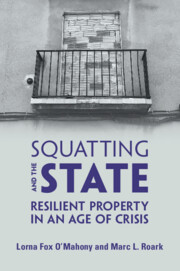Book contents
- Squatting and the State
- Squatting and the State
- Copyright page
- Dedication
- Contents
- Preface and Acknowledgments
- Introduction Squatting, Scale, and the State
- Part I Squatting and the State
- Part II Resilient Property in an Age of Crises
- Part III Resilient Property in Action
- 9 Scaling Resilience and the State
- 10 Postscript: Resilient Property and the Pandemic
- Bibliography
- Index
10 - Postscript: Resilient Property and the Pandemic
from Part III - Resilient Property in Action
Published online by Cambridge University Press: 11 August 2022
- Squatting and the State
- Squatting and the State
- Copyright page
- Dedication
- Contents
- Preface and Acknowledgments
- Introduction Squatting, Scale, and the State
- Part I Squatting and the State
- Part II Resilient Property in an Age of Crises
- Part III Resilient Property in Action
- 9 Scaling Resilience and the State
- 10 Postscript: Resilient Property and the Pandemic
- Bibliography
- Index
Summary
Political and property crises open up vital new questions for property theorists, and analyses of state responses to these crises cast new light on how property systems, and property law, adapt and evolve to meet complex challenges – while remaining institutionally resilient themselves. Resilient Property draws on equilibrium theory to understand how resilience is produced, for states and for individuals. In this postscript, we reflect on the property crises we are currently collectively facing, across the world: the impact, and aftermath of the global coronavirus pandemic. Applying the lens of our Resilient Property theory, we examine the emergency measures adopted by several governments as the pandemic threatened the health and wellbeing of citizens on a scale that was unprecedented for most of our lifetimes. As “stay-in-place” orders, including the provision of emergency shelter for unhoused or precariously housed people, collided with an upsurge in vacant commercial buildings and stalled development projects, the perfect property storm of homelessness, squatting and empty buildings/land was brought into fresh relief. Through a Resilient Property lens, state responses to property problems in the pandemic reveal the resilience needs that states were confronted with during the crisis, and the actions they took to maintain and restore equilibrium through the shockwaves of the pandemic and its aftermath
Keywords
- Type
- Chapter
- Information
- Squatting and the StateResilient Property in an Age of Crisis, pp. 379 - 412Publisher: Cambridge University PressPrint publication year: 2022



